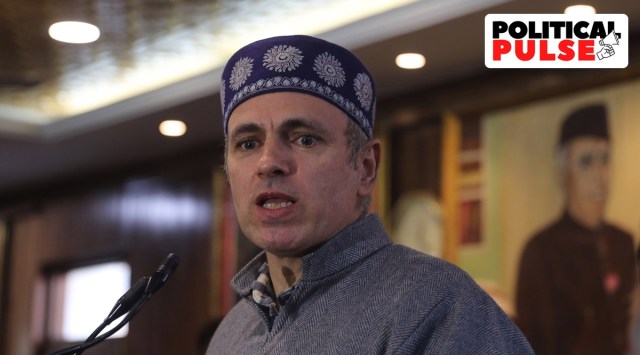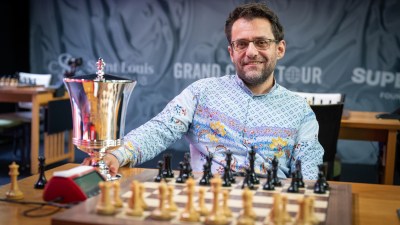Omar Abdullah: ‘Voter turnout in next J&K Assembly polls will break all records … Lot of anxiety about disconnect between people and govt’
On Article 370 proceedings in Supreme Court, NC leader says, “There were two areas the judges focussed on — the temporary nature (of Article 370) and the mechanism for change or removal … Now, we will see what the government's response is.”
 "J&K has not been the most peaceful or normal place for 30-plus years," former chief minister Omar Abdullah said. (Express file photo by Shuaib Masoodi)
"J&K has not been the most peaceful or normal place for 30-plus years," former chief minister Omar Abdullah said. (Express file photo by Shuaib Masoodi) National Conference (NC) MPs are among the 23 petitioners who challenged in the Supreme Court the Centre’s decision to abrogate Article 370 and split the erstwhile state of Jammu and Kashmir into the two Union Territories of Jammu and Kashmir, and Ladakh. As the top court hears the case, NC vice-president Omar Abdullah speaks in an interview about the submissions of the petitioners, the potential local body polls later this year, and the drug problem in J&K that The Indian Express reported in a three-part investigative series.
Excerpts:
The petitioners in the Article 370 case concluded their arguments in the SC on August 23. How are you feeling about the case as of now?
We are satisfied. We had the best legal representation for the two petitions that the NC filed. Our two lawyers and the other lawyers who have spoken on behalf of the petitioners so far have done an excellent job. Our arguments seemed to have made people who were neither petitioners nor intervenors put their points of view across.
I have been watching court proceedings every day. There were two areas the judges focussed on — the temporary nature (of Article 370) and the mechanism for change or removal. From what I could see, all the questions were answered comprehensively. I do not think more could have been done. Now, we will see what the government’s response is.
Do you think this case has a bearing on the future of mainstream politics in J&K?
How this issue plays out will have a bearing on the various political positions that parties take. Three of the important mainstream parties — the NC, the Peoples Democratic Party (PDP), and the People’s Conference — have directly associated themselves with what’s happening.
The NC appointed constituency in-charges last year. What are the conversations on the ground, with no indications of an election anytime soon?
Some are internal and related to our party coordination. We also hear a lot from people on how they are governed. There is a lot of anxiety about the disconnect between the general population and the administration. It is a fact that officers in the field are reluctant to communicate. A lot of them do not even know the language used to communicate with people. They are unaware of the topography and geography of J&K. All of this has a bearing on how the government conducts itself. This becomes apparent in the feedback from party colleagues. Regardless of who they will vote for, they want a say in who governs them. The other thing that is coming through is that voter participation in the next Assembly election — whenever it happens — will break all previous records.
There are indications that the urban local body polls and panchayat elections could be conducted this year. How is the party preparing for that?
We have a process at the district level. We are looking to identify the right people. These elections will not be on party lines. There is no symbol involved. That is both a good thing and a bad thing. Good in that everybody gets to claim victory. It is bad because it is very difficult to maintain discipline. That said, even where symbols are used, the law was changed to allow for defections. That negated the whole process. That is something future governments can address.
We have the benefit of cadre. More often than not, it is going to be a problem of plenty for us. There are going to be many people who are going to come forward, but there may not be enough mandates. Again, this is why the non-party line is a problem. Everybody can jump in and say I am representing so and so party.
Kargil will soon have its Ladakh Autonomous Hill Development Council elections. There has been an issue with the party symbol there. How are you tackling this?
For some reason, the Ladakh administration is unwilling to lay it to rest. An order was received from the single-judge Bench. They then came out with a 300-page petition to the Division Bench and were not able to convince the J&K High Court. Now they have got it mentioned in the SC. Fortunately, the SC rejected both their demands. One was to stay the Division Bench order, the second was to stay the contempt proceedings.
In an ideal world, they would have realised that they were in contempt of court by not implementing the order. The brazenness with which they are seeking to undo what the court has ordered leads one to wonder.
I mean I know why the BJP would do it … There is an element of ego that has come in. Particularly on the part of their local MP (Jamyang Tsering Namgyal) who said, “Ab Ladakh se National Conference ka nishaan hamesha ke liye hatt gaya (NC’s symbol will be wiped away from Ladakh).”
I do not understand why his anxieties have to reflect on the policies of the Lieutenant-Governor of Ladakh.
What is your sense of the scale of the drug addiction problem in J&K?
Firstly, there is an element of regret that it has taken us this long to wake up to the scale of the problem. It has been more than 10 years since I spoke about it. I had heard from youngsters about what they were using as drugs. The one that shocked me the most was shoe polish.
I realised then, and I believe now, that it is not a problem just for the government to solve. Unless civil society and religious leaders get involved, the problem will not go away. I think the government also needs to do more to address the nexus that is making drugs available and should be stopping it. But I hear from colleagues that people from the government’s side are actively encouraging it. This is not everywhere but enough to be worried about.
A trade like this will not flourish if the government is committed to clamping down on it. The government is lacking somewhere in terms of converting its intent into action. The police have to be at the forefront of this, and they have no excuse now because law and order is clearly not a problem for them.
We hear the Home Minister of India and others saying that militancy levels are at record low. So, you would expect the J&K Police to divert its attention to basic policing — crime and the problem of drugs. If the problem is not being addressed, the lion’s share of the blame will have to go to the police.
Do you think there is enough acknowledgement of the problem?
I know that there is a disconnect between the people and the government. But even they (the government) read papers. They (the government) are more sensitive to criticism than perhaps any elected government. There is no acknowledgement of the problem. The government is simply happy to let this continue and fester. You have to ask yourself why.
The NC is the only party that has an internal committee on the issue. What do you think are the reasons for this growing problem?
J&K has not been the most peaceful or normal place for 30-plus years. Time and again, studies have shown that there has been a lot of psychological damage done by the violence. I am not making an excuse for it, but the drug problem is one of the channels in which it manifests itself. One has to understand where this problem stems from. There is a lot of unaccounted easy cash that floats around, again as a result of the conflict. There are several agencies that pump in money for various reasons. It is not beyond the realm of possibility that some of that money is finding its way into drug usage.
We are also a very closed society. It is much tougher to address this problem when it is not acknowledged. So, I think it is a combination of these and many more factors.
As a political leader, what is the solution according to you?
I would like to think there are solutions. That is why the NC is actively working on a roadmap. At the moment, we also realise that all we can do is talk about the issue and we are doing so very aggressively. The party president (Farooq Abdullah) is bringing up the issue in most of his speeches. One hopes that in due course when we do have elected representatives running J&K, there will be greater interest in addressing this problem.
- 01
- 02
- 03
- 04
- 05































